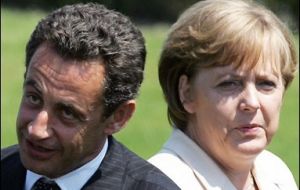MercoPress. South Atlantic News Agency
G20 summit hammering out consensus for Thursday’s formal meeting
 Nicolas and Angela insist on strict regulation for the financial sector
Nicolas and Angela insist on strict regulation for the financial sector France and Germany called for tougher regulation for the world's financial system during the first day of the G20 summit in London. French President Nicolas Sarkozy, who has threatened to walk out of the meeting, said that new financial regulation was a “non-negotiable goal”.
However in spite of the strong positions, early signs are that a consensus is emerging and a deal will be reached on time for tomorrow’s formal summit meeting in the Excel Centre in London’s Docklands.
In London's financial district, police and protesters clashed and 26 people have been arrested.
Meanwhile, US President Barack Obama and his wife Michelle have met the Queen at Buckingham Palace. Later G20 leaders arrived at a state dinner at Downing Street, where they will start to hammer out a final agreement.
There have been divisions between France and Germany, who want the financial system to be subject to far stricter rules, and the US and the UK, who have emphasised the need for more government spending to boost the world economy.
The main sticking point may be how much extra money the International Monetary Fund will receive to help countries in trouble, while there is agreement in principle on regulation and government spending.
Throughout the day, the leaders held bilateral talks to thrash out final details of the proposed reform plans. Key developments included: French President Nicolas Sarkozy and German Chancellor Angela Merkel have held a joint press conference to underline their call for tighter regulation of the global financial sector
Angela Merkel called for more support for the world's weaker nations. Prime Minister Gordon Brown, who earlier met with President Obama, insisted that a global deal is just “hours away”.
President Obama met Russian President Dmitry Medvedev, and accepted an invitation to visit Moscow in July. Both also agreed to start talks about a nuclear disarmament deal.
Obama also met the Chinese Premier Hu Jintao. The two men agreed to work together to enhance US-China relations, and Mr Obama accepted Mr Hu's invitation to visit China later this year .
Police said that up to 5,000 protesters - anti-capitalists, anarchists, and climate change activists - had descended on London's financial centre, with 26 people arrested.
Some protesters got on to the roof of the Bank of England, while windows were broken at nearby branches of RBS and HSBC.
However, elsewhere there was more of a carnival atmosphere, particularly in Bishopsgate where a climate change camp has been set up.
Earlyh morning Wednesday after a breakfast meeting with Prime Minister Gordon Brown, President Obama said a “sense of urgency” was needed to confront the most severe economic crisis since World War II.
He said the G20 had to reject protectionism and support emerging markets, and called for countries to work together.
“The United States is committed to working alongside the United Kingdom in doing whatever it takes to stimulate growth and demand and to ensure that a crisis like this never happens again,” the US President said.
Mr Brown said the G20 leaders were hours away from agreeing a plan for economic reform.
President Sarkozy and Chancellor Merkel said institutions that did not comply with new any rules agreed by the summit should be identified.
Meanwhile, the head of the International Monetary Fund, Dominique Strauss Kahn, told the BBC that the most important thing was for countries to clean up their balance sheets. He also wanted the IMF funds doubled. Indeed, the IMF may be the main winner in the summit, according to BBC economics editor Stephanie Flanders.
The summit comes as two multilateral organisations predicted the worst global economic downturn since the Second World War. The World Bank said the global economy will shrink by 1.7% this year while the Organisation for Economic Co-operation and Development put the expected contraction at 2.7%. G 20 members represent 85% of world trade.




Top Comments
Disclaimer & comment rulesCommenting for this story is now closed.
If you have a Facebook account, become a fan and comment on our Facebook Page!